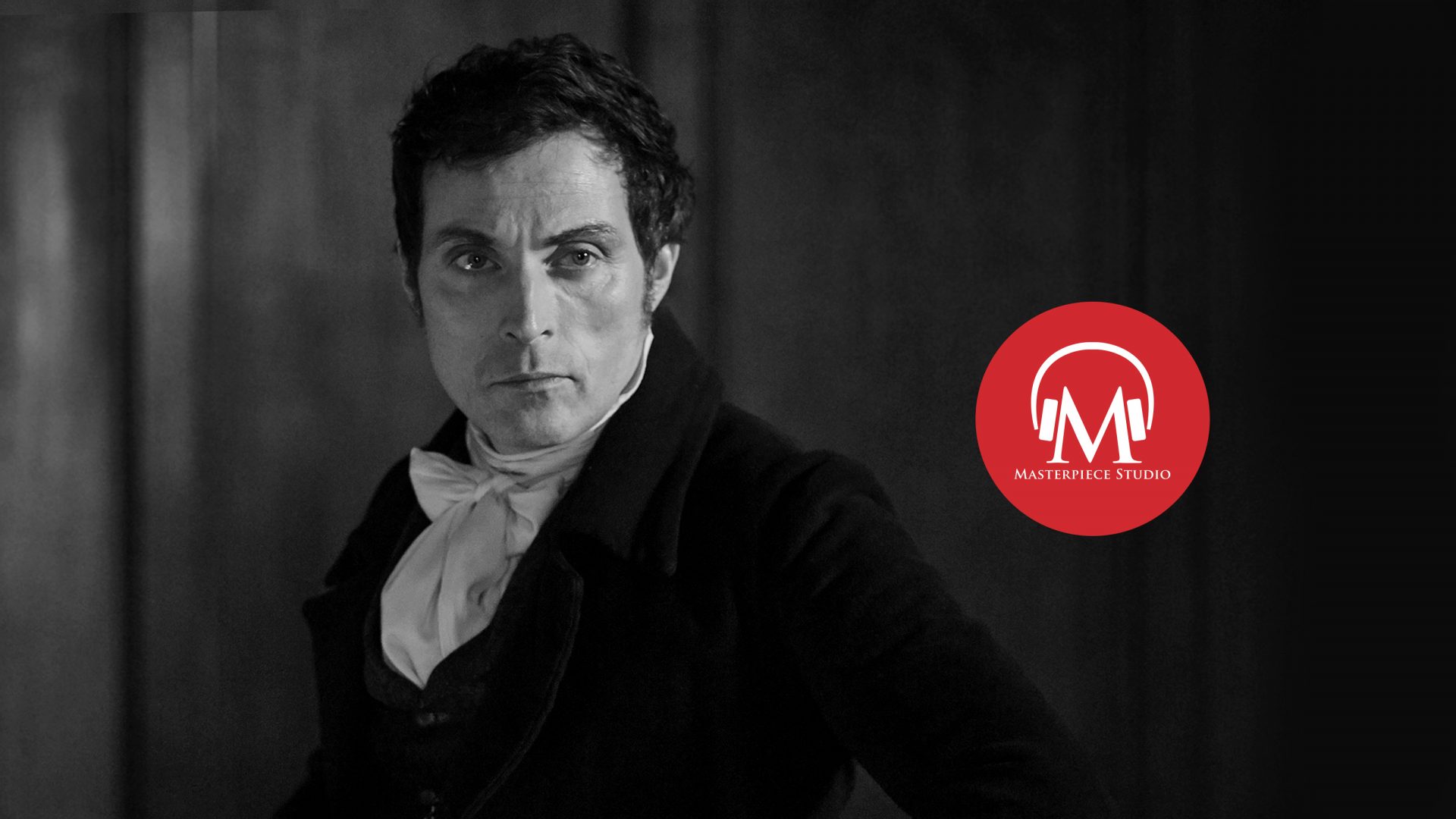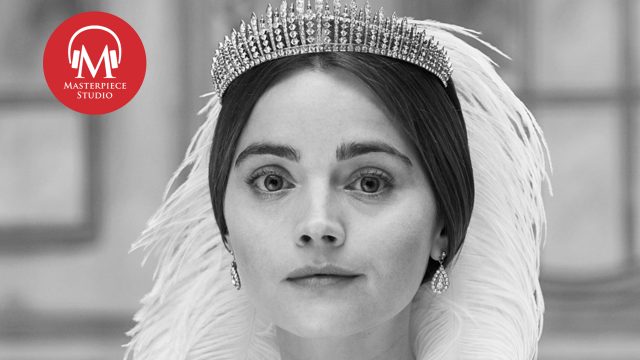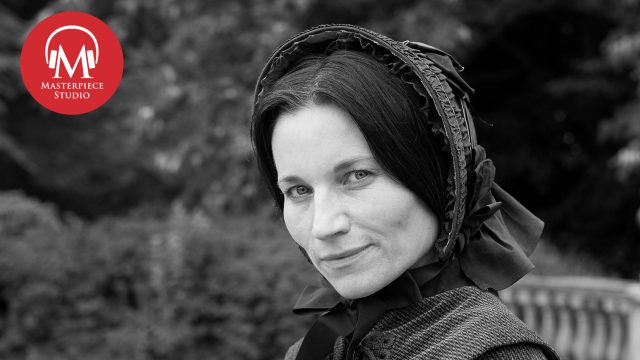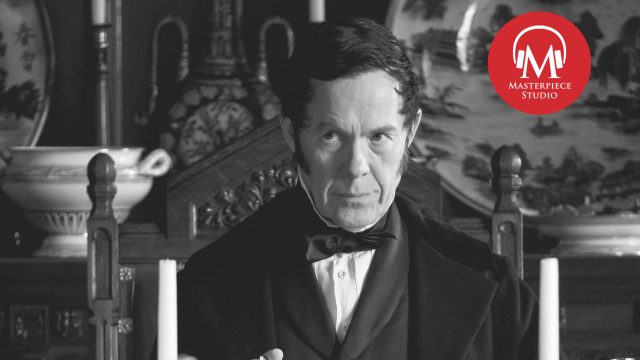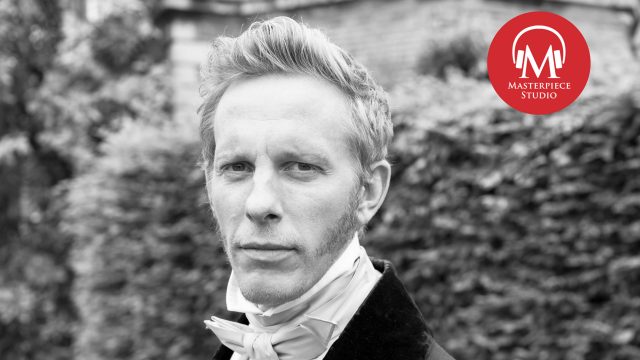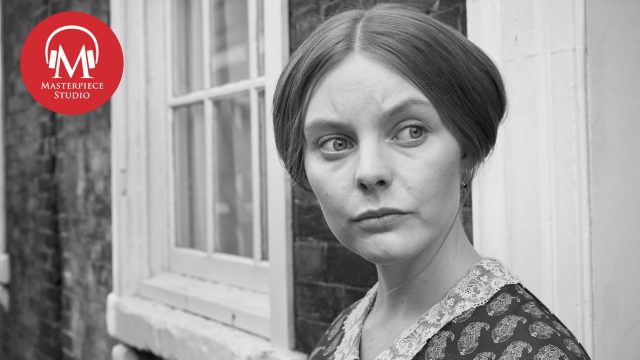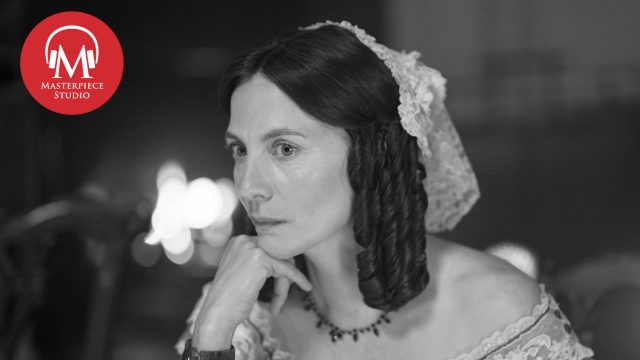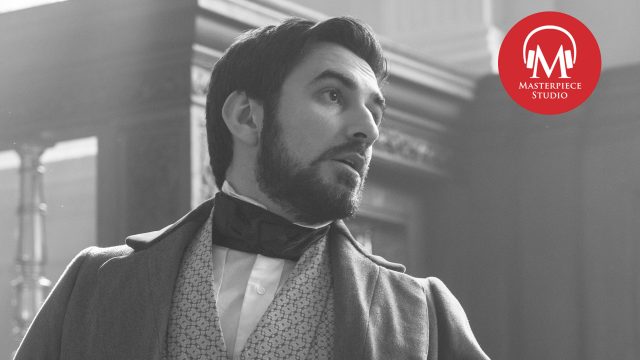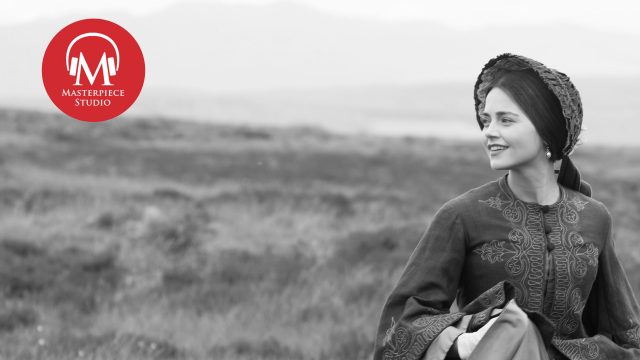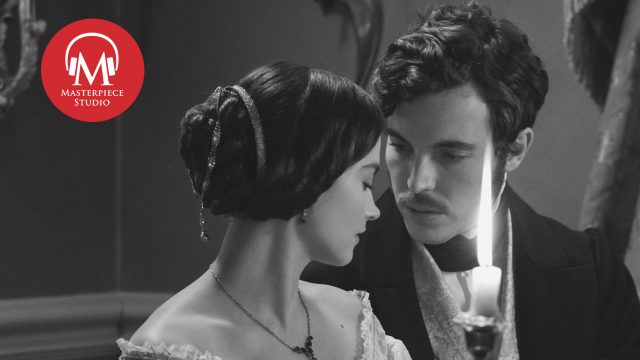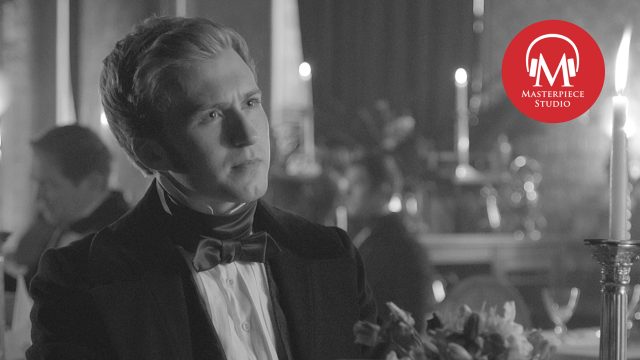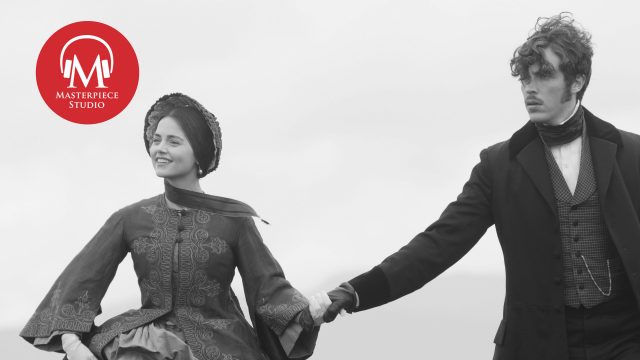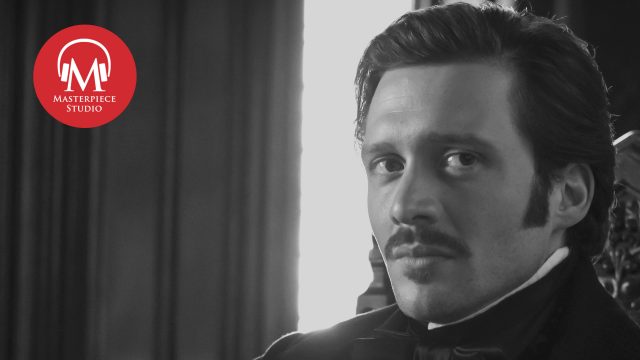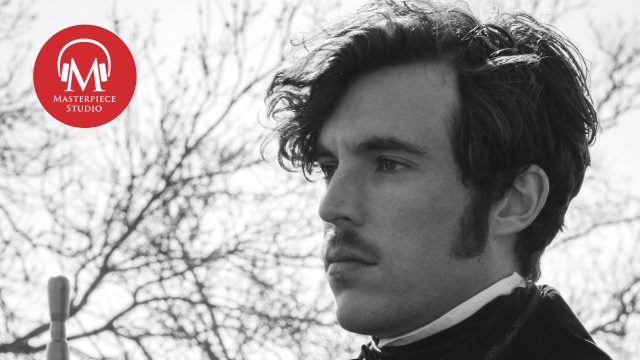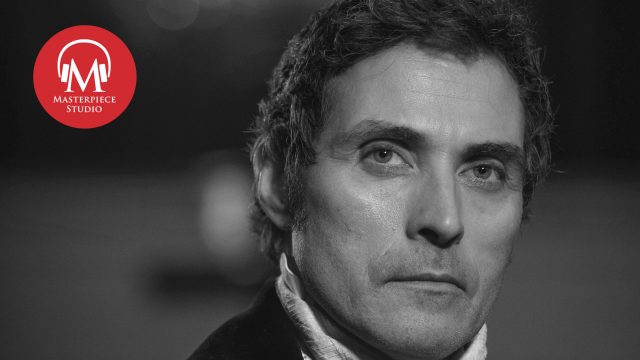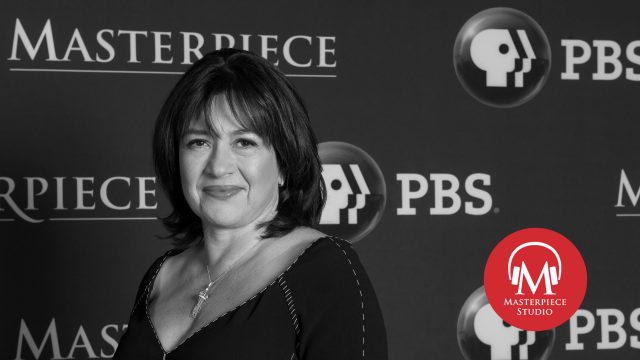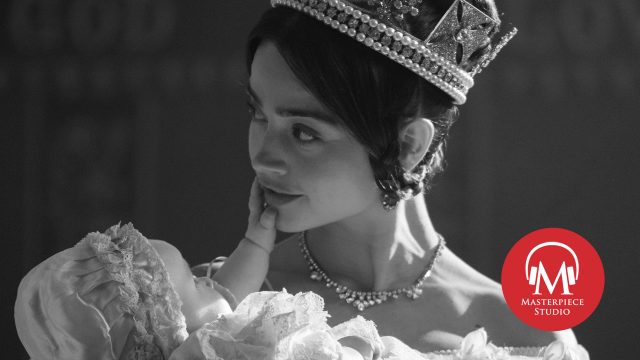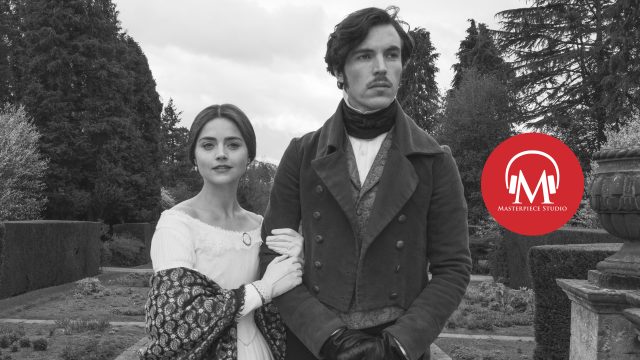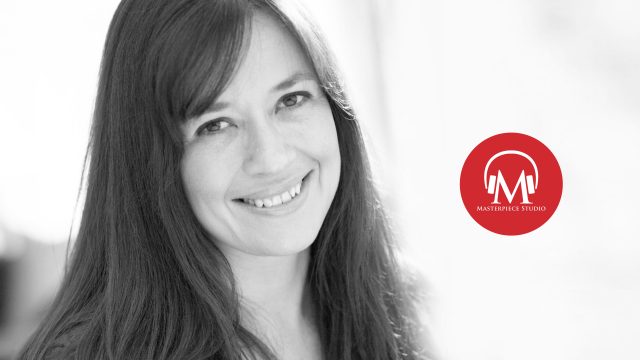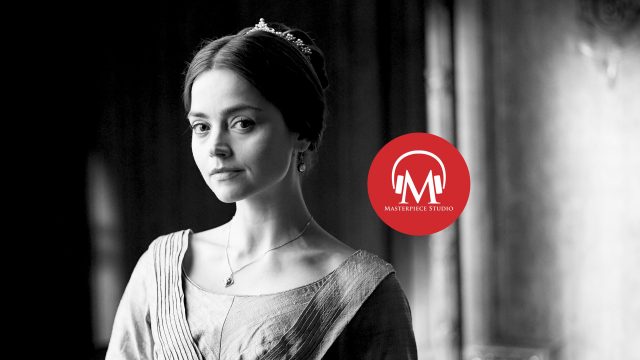Jace Lacob (Jace): Have you seen the third episode of Victoria? If not, you might want to dash off, and get all caught up before listening to this interview.
MASTERPIECE Studio is brought to you by Viking Cruises, exploring the world in comfort. Learn more at vrc.com
CLIP:
Albert: I wish you would not spend so much with Lord Melbourne. He is not serious.
Victoria: He does not choose to appear serious, it is the English manner, but, Albert, he is a man of great feeling.
Albert: Perhaps you should marry him.
Jace: I’m Jace Lacob and you’re listening to MASTERPIECE Studio.
Albert isn’t the only one who believes that Victoria should end up with Lord Melbourne. There are viewers who root for them; even Victoria herself longed for it at one point. But history decided a different fate for the pair a long time ago.
Just as it happened in real life, Victoria proposed to Albert, and Lord Melbourne accepted that it was time for him to retire and leave the handsome new couple in peace.
CLIP:
Lord Melbourne: The fact is my ministry will not last forever.
Ernest: And then?
Lord Melbourne: I will return, thankfully, to Brocket Hall.
Jace: Despite the false optimism, just as Lord Melbourne regretted leaving his companion, so too did actor Rufus Sewell.
CLIP:
Rufus Sewell: …you’ve got the characters feelings then you got the actor’s feelings about, “Does this mean my fun’s going to be over?” (Laughs)
Jace: (Laughs)
Rufus: And so it can end up being very truthful, sometimes, accidentally.
Jace: Today, Rufus Sewell joins us to talk about his time playing William Lamb, or as he’s more affectionately called Lord M, and teases his and Victoria’s final moments together.
Welcome.
Rufus Sewell (Rufus): Thank you. Nice to be here.
Jace: You play William Lamb, Lord Melbourne. What was it about the character that attracted you to the role?
Rufus: Well, many things. Because he was such a warm character, so likable, I took to him very much in the script. But I was a little… My suspicions were raised because it seemed a little too neat; it seemed a little bit like an amalgamation of so many familiar MASTERPIECE tropes, you know? (Laughs) Like it was a concoction for audience satisfaction. I just thought, “I’m not really buying this.”
Jace: (Laughs)
Rufus: “If this guy was like this and this relationship had been in any way like this then we’d know about it. It would have been overused by now. We’d be sick of it.”
So, I did a little bit of research, and I read David Cecil’s book on Lord Melbourne, which is a wonderful book, and I just found myself falling for him. And then, I returned to the script and realized it was pretty much true. I mean, as to how you would interpret the feeling, the bond, the potential love between them, that was open to interpretation at the time. There were people who believed that there was love between them; there were people who suspected there was a physicality between them.
But what really attracted me was just the fact that I found him to be incredibly intelligent, who was also incredibly sensitive and very kind, with a lot of sadness in his past; someone who’d learned a lot about himself in a very, very painful way and was at a particular point in his life.
CLIP:
Lord Melbourne: I don’t think I was ever happier than on those nights when I was sitting there, feeling my little boy drift off. When he died I thought there was no point to my existence.
Victoria: Lord M, how can you say that?
Lord Melbourne: I no longer feel that way, ma’am.
Rufus: And that really spoke to me. It touched me quite profoundly when I read the role.
And I was concerned about a couple of aspects that came up in the story, particularly about the age difference. He was a little older than me and Victoria was a little younger than Jenna, so there was this quite large age difference. So, there were two problems with that, potentially: one the kind of old perv aspect…
Jace: (Laughs)
Rufus: …which you needed to be very, very careful to walk that line and say it wasn’t someone who was trying to take advantage of a very impressionable girl who wasn’t aware of her own drives. And also, talking turkey here, I’ve been waiting for years to be in my forties because I’d always suspected that I would have hopefully come into my own a bit. The idea of reaching my mid-to-late forties… Mid-to-late forties? I’m forty-eight, who am I kidding?
Jace: (Laughs)
Rufus: The fact that I would just immediately leapfrog to fifty-eight…
Jace: (Laughs)
Rufus: …just like, “Oh g-” I mean, I felt like I was potentially missing out on ten years work, so we… And you know Jenna being a few years older and me being a few years younger, it felt a bit more natural.
Jace: I mean one UK newspaper accused the show of turning Lord Melbourne into a heartthrob when they cast you.
Rufus: Yes, yes.
Jace: But I didn’t feel like it was…
Rufus: But they talk a lot of bollocks. I mean, “Turning him into…” I mean, I’ve got a mixed attitude towards that because part of me is slightly irritated and the other part of me is enormously flattered (laughs).
Jace: (Laughs)
Rufus: I have to work those two. I don’t want to be ungrateful. At my age for them to say that, my first reaction is, “Oh, thank you very much,” and then I can become slightly miffed.
But that certainly wasn’t my choice. I was very gratified to be offered the job. And obviously, as a person, given the choice I’d rather look like the guy than look my best, and if I can actually make those two coincide, then great.
Jace: (Laughs) Now, the early episodes of Victoria focus on the rapport between the young Queen and her closest advisor. How would you describe the bond between Victoria and Lord M?
Rufus: Well, Victoria at that age… She was eighteen when they first met, and a very young eighteen. She had been very cosseted, and closeted. I mean, she’d never really spent the night away from her mother; she wasn’t allowed to go down the stairs on her own. She’d never had any contact with any loving, male father figure; she lost her father very, very young. And Sir John Conroy was a very controlling part of her life. He was involved with her mother, to what extent… It’s still undecided whether that was physical, that relationship, or not.
But by the time she met Melbourne he was the first person who’d ever listened to her without some ulterior motive. And I think that had a tremendous affect on her. I mean, she was a little suspicious and very awed by her situation, but she found that she immediately met someone who listened to her in a way that she’d never been listened to before.
Now, she’d never had any kind of physical, sexual life before. She’d never had any father figure before, and all of those things were mixed up, I believe, and it seems a bit, in some ways, like it was an obsession, maybe both ways.
I mean, he’d lost a child. He had a past where he’d… He’d always been attracted to very, very brilliant women. And when Melbourne grew up, he grew up in a very- this is the period before Victorian age. In fact, it was the period that gave rise to it because it was much like the ’60s.
Jace: (Laughs)
Rufus: He grew up in a very free, artistic era, and was, through his life, always attracted to very, very bright women.
The main attraction to me towards Melbourne was that: that he was kind of ahead of his time in one sense, but in fact, he was of his time, which was the time before Victoria. And Melbourne is a bit of a hangover; he was a kind of a crossover between those two periods… I forgot the question (laughs).
Jace: (Laughs) Well, on that note, I mean, he is no stranger to scandal. Between Lady Caroline Lamb’s affair with Lord Byron, who she termed, “Mad, bad, and dangerous to know,” and his criminal conversation with a married woman.
Rufus: Yes.
Jace: Does the scandal of Lady Flora’s…
Rufus: Criminal chat (laughs).
Jace: Criminal chat, which is the most Victorian way of having an affair.
Rufus: Yeah.
Jace: Does the scandal of Lady Flora’s distress help bring Lord M and Victoria to a closer understanding, given their proximity to scandal?
Rufus: I’m not sure, really. I mean, there’s so many things that bring them closer. I think, Melbourne has an understanding of the way the press are, and the way people are, and public opinion that, through the course of his life, he has come to have an attitude about what people think. And his attitude towards the public is — well, I can’t swear — but, “Stuff them.” You know? “Who gives a toss what they think?”
There was a line that was actually cut from the series when she said, “What should I …” Well, Victoria says, “What shall I do about what they’re writing about me?” And this meant a lot to me at the time.
Jace: (Laughs)
Rufus: I said, “Well” … She said, “What did you do when they called you this and called you that?” He said, “I stopped reading the papers.”
Jace: (Laughs)
Rufus: And so, he has that perspective. Like you either do good by what your personal code is or you worry about what strangers think.
Jace: Victoria refuses to give up her ladies leading to the Bedchamber Crisis. Is this the act of a petulant child or a canny political operator? Does she know what she’s doing in refusing Peel?
Rufus: Well, I have a three-year-old girl and I think your mistake is thinking there’s a difference between a petulant child and a canny political operator.
Jace: (Laughs)
Rufus: (Laughs) These two things can coincide. I think, both, and that’s what makes the character complex and interesting. I mean, petulant children often end up with candy (laughs).
Jace: (Laughs)
Rufus: Or they end up watching Frozen for the eighty-seventh time or whatever it is — I speak from experience — that they want, if you’re not careful.
Yeah, she didn’t have a chance to grow up properly before she became queen, and it’s very difficult to grow up after you come into power. It’s true that fame, like addiction, freezes you emotionally (laughs). So, if someone becomes super famous at twelve years old, chances are, when you come to them at twenty-five you have emotionally a twelve-year-old. That’s pretty much, I imagine, what happened to Victoria is that… It’s very difficult to keep growing emotionally if suddenly everyone has to say “Yes” to you. That’s why fame has the same effect.
I mean, I’m thinking off the cuff here, but that’s why Melbourne was so wonderful. He’d grown up with kings and royalty; he was one of them. He knew who he was and he was able to tell the truth and be himself in any situation. And he was the only person in the world, for a very long time, who could tell her what he thought. And I think it’s remarkable how he resisted the temptation to manipulate her as much as he did.
Jace: Before our next question, a message word from our sponsors.
MASTERPIECE Studio is brought to you by Viking Cruises. See the world differently by exploring differently. Learn more at vrc.com.
MASTERPIECE Studio is also brought to you by Farmers Insurance and their eighty-eight years of experience helping people so that they can prepare for the unexpected. They know a thing or two because they’ve seen a thing or two. Find an experienced agent at farmers.com.
Jace: Now, there’s a real poignancy to many of their scenes together. My favorite scene between Victoria and Lord M is at Brocket Hall.
CLIP:
Victoria: At the beginning, I thought you were the father I never had, but now, I feel- I know that you are the only companion I could ever desire.
Jace: What was it like shooting that particular scene?
Rufus: I loved it. I mean, I absolutely loved working with Jenna. We had such a good time. I don’t really… When Damien Timmer, whose show it was, came to visit, he was perplexed by seeing how completely silly we were.
Jace: (Laughs)
Rufus: When we were hanging out out with each other, it’s not like we would hang around off camera and stare at each other mournfully (laughs).
Jace: (Laughs)
Rufus: I mean, a lot of that fun comes through, actually. I think that is what the relationship is. Yes, there’s a lot of intensity, but it’s how much fun we have. And that’s very, very true. Me and Jenna were absolute twits together. We would worry when they’d have EPK, when they would come and film behind the scenes. We would suddenly realize we’d been filmed just being idiots.
Jace: (Laughs)
Rufus: But the rookery scene, it was… We were aware of how significant it was. And it’s sometimes a bit… I try not to listen to people when they say how much they’re looking forward to a scene, because you don’t want that kind of pressure. You just want to think of it as no more important than any other moment in your life, and then just let what happens happen.
But they don’t get many moments of physical intimacy; there are only a couple where they’re even able to touch. And it was very, very powerful to do it. You are just aware of how this was very significant moment for the two of them.
CLIP:
Lord Melbourne: I believe when you give your heart it will be without hesitation, but you cannot give it to me.
Victoria: I think you have it already.
Lord Melbourne: No, you must keep it intact for someone else. I have no use for it, you see.
Jace: It’s just a stunning, beautifully shot scene. It’s just incredible.
Lord M continuously acknowledges the fact that Victoria will have to marry and that he won’t be Prime Minister forever. How does that color their interactions? Is there a sense that this rapport could evaporate at any time?
Rufus: I don’t know. I mean, in truth… I mean, it was very important for me coming into this is that he wasn’t someone who was angling to be with Victoria. I think, there were kind of romantic feelings that he was trying to keep away, there were fatherly feelings, there were all of these different conflicting things, but he knew that that could not be, always.
So, the fact is, historically, when… He helped the the connection with Albert come about. He enabled that. He did everything he could to make it happen, in reality, and it cost him.
Jace: He insists that she will never be happy alone, even with companions, and he says…
CLIP:
Lord Melbourne: You need a husband to love you, honor you, cherish you.
Jace: But later refers to Albert as “The Clockwork Prince.”
Rufus: Yes.
Jace: What did Lord M make of Albert, specifically, as a potential husband for Victoria?
Rufus: Well, I think, at first, he was concerned that Albert was not a man who would appreciate this fantastic woman. I mean, he was a great admirer of Victoria. The idea that someone would come along who couldn’t appreciate what she actually was… And to his eye, this poe-faced, clockwork figure, this mirthless German turning up, who doesn’t see her as a woman but just as a notch on a political belt, so to speak, for his family, is such a tremendous waste.
And I think, his primary concern was that she would be with someone who didn’t get her or appreciate her. Now, he conceded eventually that he was mistaken about that. But I think it’s a mixture of things: a mixture of genuine concern that she was going to be with someone who didn’t appreciate her, mixed with a little bit of natural, human jealousy.
Jace: I mean, it’s no coincidence that at the ball they dress as Queen Elizabeth and Robert Dudley…
Rufus: Yeah.
Jace: …which I thought was a great touch.
Rufus: Yeah.
Jace: They sort of… I don’t know. Maybe they did have a courtly love that would never have any physical implications or maybe they were true companions.
Rufus: Yeah, no. I mean, I think, in our telling of the story, we’re not suggesting that there is some physical life that they have beyond what the audience sees. But there is certainly a point, in our story at least, where she is considering not marrying and taking a cue from Queen Elizabeth — not marrying but potentially having companions — in which case there’s no reason why that couldn’t happen. What Melbourne knows couldn’t happen is that they can’t marry. So, I think there’s just one elongated moment when that idea is allowed to live, but it’s very quickly dashed.
CLIP:
Victoria: Lester was her companion?
Lord Melbourne: He was. He did have a wife, but then she died.
Victoria: But even though he was free, they never married.
Lord Melbourne: I think he and the Queen understood that they were not in a position to marry whatever their inclination.
Jace: Now, he admits that he won’t read Dickens because “He doesn’t want to read about pickpockets and thieves,” and Albert relates to the sight of the matchbook girl he met saying, “I would rather see things for what they are.”
Rufus: Yes.
Jace: What do these very different men’s approaches to poverty say about them and their political style?
Rufus: I don’t know. I mean, I was very resistant to the idea of reducing it to- especially when Melbourne was being phased out. I didn’t like the idea of him suddenly saying all the objectionable things he’d ever said just in one episode, just to self eradicate (laughs)…
Jace: (Laughs)
Rufus: …because he had complex ideas about it.
He was an incredibly sensitive person, but he… Very much of his time, he was a believer that the poor will be the poor, and you can do a certain amount to alleviate them but it’s just the way the world works. Now, that was one of the problems of, and is one of the problems of, approaching a part is you have to get your head around everything that they think and not just try to bend it to your own proclivities.
To that extent, he was a man of his time, and Albert felt differently. And I think, personally, I agree more with Albert in that sense, but… (Laughs)
Jace: (Laughs) Lord M announces his intentions to retire to Brocket Hall and end his political career and thus his role as advisor to the Queen.
Rufus: Yes.
Jace: Was tutoring Victoria ultimately his greatest accomplishment?
Rufus: According to who was it his greatest accomplishment?
Jace: Perhaps to him?
Rufus: I don’t know. I mean, I don’t think Melbourne was someone who really would think in terms of great accomplishments. I mean, he was someone who went into politics sideways. He wasn’t a man of great ambition. He was a man of deep and abiding suspicion of anyone with great ambition or great- greatly or fervently held beliefs or strong principles of any kind (laughs).
Jace: (Laughs)
Rufus: So, I don’t know. I would say that it would be his time- it would be the period of his greatest happiness.
Jace: Victoria leans very heavily on Lord M and Baroness Lehzen during her early tenure as queen, but the arrival of Albert changes both of those dynamics considerably. Have they been replaced in a way, Lord M and Lehzen?
Rufus: Oh, I think they’ve certainly been replaced. I mean… And as Melbourne says, “And that’s as it should be.” That’s what I meant before. It’s like, it doesn’t mean he’s not sad about that, but he’s… It’s that old troupe, “I feel my work here is done.”
Jace: (Laughs)
Rufus: It doesn’t mean you have to feel good about it as you turn to the sunset or whatever the British equivalent is, clouds.
Jace: (Laughs)
Rufus: But I think they have been replaced. There was no doubt that Melbourne cannot continue to do what he has been doing, and there’s no use for him anyway once Albert is on the scene.
I mean, it’s certainly true that, in reality, Melbourne and Victoria continued to write to each other, even when they’d been banned (laughs). They were like two kids who had to be separated in class. And so it took a little while for that to fizzle out, but it’s certainly true that Melbourne was replaced in every way. Yeah.
Jace: So, the time for his retirement draws ever near. Next week is the last we see of Lord M.
Rufus: Yes.
Jace: What can viewers expect from Victoria and Lord M’s final scene together?
Rufus: Well, I mean, the whole episode for me was actually… I wasn’t looking forward to playing it because it was a very difficult balance, because I really didn’t want to be moping around looking like I was resentful. I mean, I didn’t want Melbourne to be looking like he was resentful. But it was very… He’s doing the right thing and he’s struggling with the feelings that that produces in him.
Partly… I mean, these are strange things doing these scenes because you’ve got the characters feelings, then you got the actor’s feelings about, “Does this mean my fun’s going to be over?” (Laughs)
Jace: (Laughs)
Rufus: And so it end up being very truthful, sometimes, accidentally.
Yes. I mean, I don’t like to talk up anyone’s expectations because, for one, as an audience member it always makes me enjoy things less. If I’m told a character is charismatic or attractive, I tend to watch and think, “No, they’re not.”
Jace: (Laughs).
Rufus: If I’m told a film is amazing, I tend to think, “It’s not that good.” So, I don’t want to… But anyway…
Jace: So downplay it, downplay it.
Rufus: Yeah, well, absolutely.
Jace: “It’s an okay scene.”
Rufus: “Well, it’s fine. It’s okay if you like that kind of thing.”
Jace: (Laughs)
Jace: Lord M is such an engaging figure that many people have been actively rooting for Victoria to end up with Lord M despite, you know, history.
Rufus: (Laughs) Yes. Despite history and fact.
Jace: History and things. Facts.
Rufus: And stuff.
Jace: (Laughs) What do you make of that reaction?
Rufus: I think they’re very wise.
Jace: (Laughs)
Rufus: Very good taste; they’re a clever bunch. I mean, again, it… The idea that they… It means that, obviously, something’s going right, and it’s also going right, I believe, that after a couple of episodes they absolutely adore Albert and Victoria and the Melbourne thing starts to recede into the past, as it should. It’s like my job as an actor is similar to Melbourne’s job, I think. It’s to hand it over and know that if my work is truly done they’ll forget about me soon enough and start liking Albert. And by the same token, in reality, I have mixed feelings about that (laughs).
Jace: (Laughs)
Rufus: Just like… So, my own experience mirrors Melbourne, slightly.
Jace: Now, this would seem to be the polar opposite to the role of John Smith, which you were doing on Man in the High Castle. Did you experience any whiplash going from those two roles?
Rufus: No. Well, not really. I mean, this is an analogy I’ve used before but it’s only because I think I’ve found the right one I’m going to stick with it. You know how a light meter works in a camera? It basically reads gray. So if you point it at white, it imagines it’s gray; if you point it at black, it imagines it’s gray, and that’s how it balances the light. That’s basically what I try to do. As far as I’m concerned, I look at John Smith and I try to avoid seeing that as black, and that’s quite easy because the character is a mixture of all things.
I mean, I only ever… There was a point when I used to complain about being cast as bad guys; I only really complained about bad writing. In good writing there’s no such thing, just like in reality. I mean, people obviously veer closer one way or another, but all people and all good writing has enough texture in it for it not really to matter. If it’s continually good writing, really good writing, I don’t care if I do fifteen period dramas or fifteen so-called “bad guys” in a row.
And Melbourne… I mean, I suppose there wasn’t a lot of darkness, a lot of sadness. There’s a lot of color in Melbourne. But see, it’s very rare that I get the chance to play someone I like so much. It’s not unknown. I’ve played a lot of characters that I like, it’s just they tend not to be in things that people see (laughs).
Jace: (Laughs)
Rufus: But no, there was no whiplash for me. They both feel- I mean, worrying thing to say, but they both come equally naturally to me.
Jace: (Laughs) True or False, Dame Judi Dench helped you get an agent?
Rufus: That’s true. That is true. She came to direct us… Wait, actually she didn’t. She came to talk to us at Central School of Speech and Drama or Central School of Screech and Trauma as we called it.
Jace: (Laughs)
Rufus: And she came to give us a talk, and a very confident, American actor, Ben Browder, lovely guy, put his hand up and said, “Would you like to come and direct us?” And we were like, “Shh, Ben! Don’t be so American.” And she said, “Oh, I’d like to. Yes.”
Suddenly Ben was a hero.
Jace: (Laughs)
Rufus: And she came back to direct us in The Scottish Play, and I was playing the porter and Seyton, actually– it was a double role. Through doing that, she ended up fixing me up with her agent, Julian Belfrage. I mean, he died a few years ago, but he was a wonderful agent, but I’m still with his agency.
Jace: Oh, I love that story.
Rufus: It was great for- if I was unemployed for a huge amount of time, sometimes I could cheer myself up by thinking, “Well, she must think I’m alright.”
Jace: (Laughs) Zen and 11th Hour only lasted one season; Lord M’s days on Victoria were numbered. Is there freedom in choosing limited run roles rather than tying yourself to a potentially long-running, American TV series?
Rufus: Why yes there is. I mean, 11th Hour is a different thing because 11th Hour looked like it was going to continue and I personally didn’t want it to. So, when it didn’t get picked up, though I was unhappy for the people that wanted the regular work, I felt relieved. And it was a great lesson for me to- that actually, unemployment with a hint of some excitement in the future was more my cup of tea than certainty of regular employment and money at the expense (laughs) of some other things.
Jace: So you’re not signing off to join the cast of Doctor Who for seven series?
Rufus: Well, I don’t know. Just like I said I’d never do a network show again… Unless I change my mind.
Jace: (Laughs)
Rufus: Like I have felt a certain way. I find like I make really strong statements, and then the next day I’ll feel different.
Jace: It’s about the work.
Rufus: It’s about the work. I mean, it always was, but it’s very hard to maintain focus sometimes. It’s very, you know…
I remember once trying not to read reviews at all, because that felt like a very healthy idea, but I became so obsessed with reading people’s eyes and foreheads when they came to see me after the show– whether I could tell if I had been mauled in The Daily Mail from their eyebrow movements.
Jace: (Laughs)
Rufus: I realized it was better to just read the bloody things. Then, I felt impervious, and that was true. So, I think it’s just about the attitude you have. It is all about the work, but it’s hard not to let these things screw with your head sometimes.
Jace: Rufus Sewell, thank you so much.
Rufus: Thank you.
Jace: Thankfully, Rufus Sewell’s time on Victoria isn’t over just yet. Catch Lord Melbourne’s touching goodbye next Sunday at 9 pm ET on MASTERPIECE.
Then, two weeks from now, writer Daisy Goodwin, the woman responsible for breathing new life into 19th century history, sits down with us to offer her take on Lord M and Victoria’s complicated relationship.
CLIP:
Daisy Goodwin: They went riding every morning. They had dinner together. I mean, they were inseparable for three years, and then, Albert turns up and then, you know, sex rears its ugly head.
Jace: On February 12th, you can hear Daisy’s revealing interview by visiting our website, pbs.org/masterpiecepodcast, or by downloading the podcast — MASTERPIECE Studio — for free on iTunes or Stitcher.
Finally, enter the ‘MASTERPIECE 2017 Sweepstakes’ from now until March 15, 2017 for a chance to travel to the UK – and more. Go to pbs.org/sweepstakes for prizes and details.
MASTERPIECE Studio is hosted by me, Jace Lacob and produced by Rachel Aronoff. This episode was edited by Kathy Tu with help from Elisheba Ittoop. Special thanks to Barrett Brountas and Susanne Simpson. The executive producer of MASTERPIECE is Rebecca Eaton.
Sponsors for MASTERPIECE on PBS are Viking Cruises, Farmers Insurance, and The MASTERPIECE Trust.








